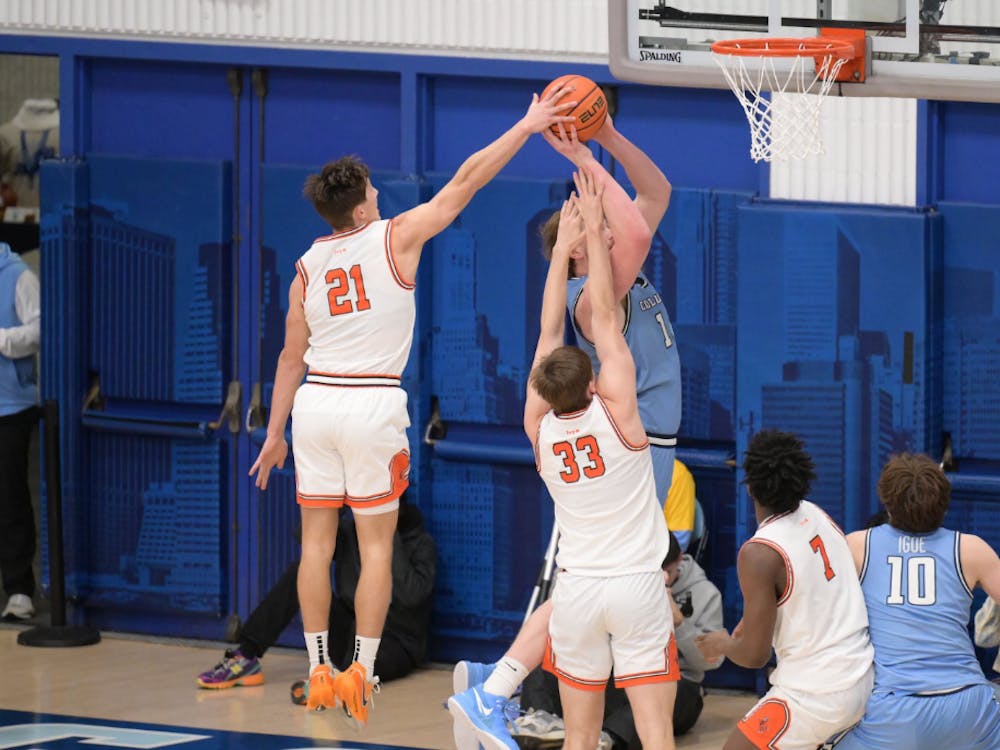With the arrival of a new football coach, thousands of questions arise. Fans wonder whether the coach will use a new offensive set. Alumni ponder if he can return the program to past glory. Administrators hope that the new regime can fill a stadium.
To the players, while these matters are certainly important, many other questions — more detailed in nature — arise. What is the team dress code on road trips? Where does the team eat? What are the team policies for day-to-day events?
To help garner player input regarding such issues, first-year head coach Roger Hughes set up a committee, the Unity Council, shortly after his hiring in January.
The council consists of two representatives from the senior, junior and sophomore classes as well as team captain Mike Higgins — a senior — in addition to coach Hughes. Each of the representatives was selected by football-playing classmates before spring practice began, last semester. The current freshmen will vote on their representatives midway through the season, giving them time to make an informed choice.
Tagi
"[The council] was designed for two reasons: to open lines of communication between the coaching staff and the players," senior representative Nathan Podsakoff said. "Its secondary function was to serve as a disciplinary committee if the need should arise."
The other senior selection to the council was Ross Tucker, while Bob Farrell and Jon Ganter represent the junior class, and Rob Currey and Chris Havener are the sophomores.
"It's a lot of the smaller things," Podsakoff said, "like using the locker room full time, and how we want to eat on the road. One of coach [Hughes'] philosophies is 'attention to detail.' And he's really trying to put that into action with the Unity Council."
Hughes first became exposed to the idea of the Unity Council as a graduate assistant with the University of Nebraska. Since instituting the council shortly after his hiring last winter, he has learned a great deal about student life at Princeton and how it differs from Dartmouth, where he spent the past seven years as an offensive coordinator. For example, Dartmouth's academic year is divided up into quarters, unlike Princeton's semester system, with exams after winter vacation.

"I'm always asking them, 'What's your class schedule like?' Is it realistic to have practice at this time?' When you're dealing with the number of players and the multitude of schedules, [the Council] certainly helps with scheduling," Hughes said.
Furthermore, as the name of the council would indicate, it helps create a sense of togetherness among the players and coaches. The council offers players a chance to have a say in the running of the team.
"If the kids have ownership, it's their team," Hughes said. "While I'm directing it, the coaching staff is guiding it, it's their team. I think if they have ownership, they'll take a lot more pride in it."
Indeed, while Hughes' control is not challenged by the council, it has brought issues before the coach that otherwise might have fallen through the cracks. For example, during the preseason, the players complained about their ancient, canvas practice shorts that seemed to harken back to the 1950's. The shorts were summarily replaced.

"I'm trying to develop a family culture here," Hughes said. "You've got to have communication if you're a family, and we're trying to establish a venue for that."
The Unity Council serves as another example of the sweeping changes that Hughes has brought to Princeton. While the ones on the field may take some time to implement, the Council has already been a success.
"Mainly [the representatives] serve as go-betweens between coaches and the team," Ganter said. "It's been a great experience. I think it's a really great thing — a really good idea by coach Hughes."







